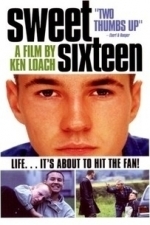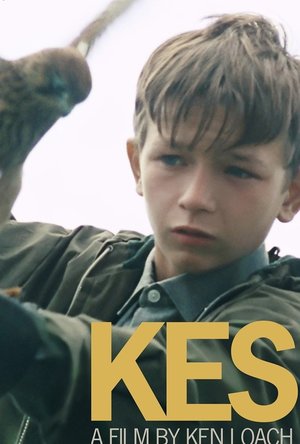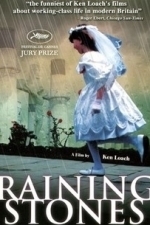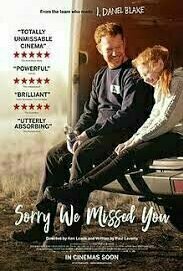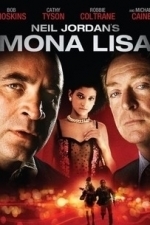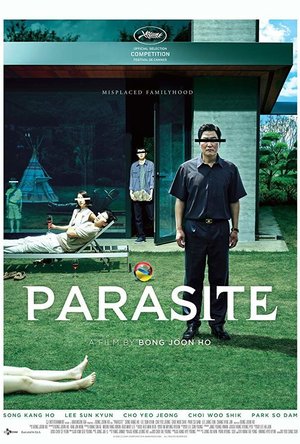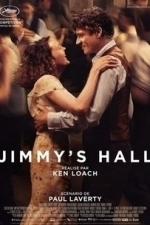Search
Search results
Robert Eggers recommended Sweet Sixteen (2003) in Movies (curated)
Garth Davis recommended My Name Is Joe (Mein Name ist Joe) (1999) in Movies (curated)
David Zellner recommended Kes (1969) in Movies (curated)
John Bradley recommended Raining Stones (1993) in Movies (curated)
Jeremiah Zagar recommended Kes (1969) in Movies (curated)
Michel Gondry recommended Kes (1969) in Movies (curated)
Awix (3310 KP) rated Sorry We Missed You (2019) in Movies
Nov 5, 2019
Another fiercely committed piece of social drama from Ken Loach. The husband and father of a family on the breadline takes a job as a delivery driver in the so-called 'gig economy'; meanwhile, his wife is on a similar zero-hours contract for her work as a carer. The sheer relentless grind of the work and the ceaseless stress that accompanies it - along with the gradual realisation that they have no rights or protection - slowly tears the family apart.
A fairly typical Loach movie, in that it doesn't really aspire to entertain, nor does it attempt to be impartial. The film's thesis - that zero-hours contracts and the gig economy are just mechanisms to exploit the most vulnerable section of the workforce - is left implicit, but is put across with the customary power. This is no-frills film-making, and rough around the edges in places - but the decision to cast non-professionals in key roles pays off as they give deeply affecting performances. I have seen movies about homeless children in Syria which were less emotionally wrenching to watch than this one. An angry film, and one which seeks to communicate that anger to the audience; quite possibly a very important film, but not at all easy viewing.
A fairly typical Loach movie, in that it doesn't really aspire to entertain, nor does it attempt to be impartial. The film's thesis - that zero-hours contracts and the gig economy are just mechanisms to exploit the most vulnerable section of the workforce - is left implicit, but is put across with the customary power. This is no-frills film-making, and rough around the edges in places - but the decision to cast non-professionals in key roles pays off as they give deeply affecting performances. I have seen movies about homeless children in Syria which were less emotionally wrenching to watch than this one. An angry film, and one which seeks to communicate that anger to the audience; quite possibly a very important film, but not at all easy viewing.
Jeremiah Zagar recommended Mona Lisa (1986) in Movies (curated)
Bob Mann (459 KP) rated Parasite (2019) in Movies
Feb 9, 2020
It’s so metaphorical.
Everyone said “Go see Parasite”. Everyone said “The one rule about Parasite is that you don’t talk about Parasite”. So I went to see Parasite. So this is a review about Parasite without talking about Parasite.
Kim Ki-Woo (Woo-sik Choi) is a student living with his family in poverty in a sub-basement room, sponging off internet signals and scrounging a living, of sorts, by assembling pizza boxes. Opportunity presents itself when his best friend, the slightly older Min (Seo-joon Park), goes abroad to study. For Min is an English tutor to the up-market Park family’s school-age daughter Da-hye (Ji-so Jung). Not wanting his fellow ‘frat-boys’ to move in on future romance – he’s lined up Ki-Woo as his replacement.
Ki-woo knows he’s lucked in when he visits the swanky Park residence and manages to pull the wool over the eyes of Da-hye’s not too bright mother Yeon-kyo (Yeo-jeong Jo). But the influence of the family’s “lucky rock” doesn’t stop there. Ki-woo sees an opportunity to get jobs for his sister Kim (So-dam Park), his father Ki-taek (Kang-ho Song) and his mother Chung-sook (Hye-jin Jang). And gradually the poor Kim family start to encroach on the rich Park family’s lives.
You might think that’s the story. It’s not. Just when you think you know where the film is going – a gentle comic tale with farcical elements – the movie takes a sudden left turn into The Twilight Zone.
To say more, if you’ve not seen the film, would be cruelty beyond measure. It’s a truly astonishing script, by writer/director Bong Joon Ho, and my nomination for the Oscar for best original screenplay.
It’s the details that get to you. This will be a superb film to watch multiple times. There are fabulous details scattered throughout. You know how the more expensive the car the more “solid” the clunk is as you shut the door? Listen to the sound effect when the Park front door shuts! Look what happens to the “one of a kind” lucky rock!
As for one of my favourite films from last year – “The Farewell” – you very quickly get to accept and embrace the subtitles. YOU MUST NOT LET THIS PUT YOU OFF. This is a masterpiece of cinema, well-deserving of its multiple Oscar nominations and its Cannes Palme d’Or award. At 132 minutes, it’s not a short film, but seldom have two hours flown by faster. It’s totally gripping. At times hysterically funny; at times shocking. A class struggle movie of a calibre that Ken Loach would never have imagined!
Gripes? I had just one. An action near the end of the movie seems bizarrely out of character and was a “WTF” moment that I didn’t think the film needed. However, it did set up a wonderful story-telling finale that I will think about for many months.
It provoked that seldom found reaction in the cinema when the end-titles ran. A hubbub of chatter and appreciation.
It comes with a highly recommended from me.
For the full graphical review, check out https://bob-the-movie-man.com/2020/02/09/one-manns-movies-film-review-parasite-2020/.
Kim Ki-Woo (Woo-sik Choi) is a student living with his family in poverty in a sub-basement room, sponging off internet signals and scrounging a living, of sorts, by assembling pizza boxes. Opportunity presents itself when his best friend, the slightly older Min (Seo-joon Park), goes abroad to study. For Min is an English tutor to the up-market Park family’s school-age daughter Da-hye (Ji-so Jung). Not wanting his fellow ‘frat-boys’ to move in on future romance – he’s lined up Ki-Woo as his replacement.
Ki-woo knows he’s lucked in when he visits the swanky Park residence and manages to pull the wool over the eyes of Da-hye’s not too bright mother Yeon-kyo (Yeo-jeong Jo). But the influence of the family’s “lucky rock” doesn’t stop there. Ki-woo sees an opportunity to get jobs for his sister Kim (So-dam Park), his father Ki-taek (Kang-ho Song) and his mother Chung-sook (Hye-jin Jang). And gradually the poor Kim family start to encroach on the rich Park family’s lives.
You might think that’s the story. It’s not. Just when you think you know where the film is going – a gentle comic tale with farcical elements – the movie takes a sudden left turn into The Twilight Zone.
To say more, if you’ve not seen the film, would be cruelty beyond measure. It’s a truly astonishing script, by writer/director Bong Joon Ho, and my nomination for the Oscar for best original screenplay.
It’s the details that get to you. This will be a superb film to watch multiple times. There are fabulous details scattered throughout. You know how the more expensive the car the more “solid” the clunk is as you shut the door? Listen to the sound effect when the Park front door shuts! Look what happens to the “one of a kind” lucky rock!
As for one of my favourite films from last year – “The Farewell” – you very quickly get to accept and embrace the subtitles. YOU MUST NOT LET THIS PUT YOU OFF. This is a masterpiece of cinema, well-deserving of its multiple Oscar nominations and its Cannes Palme d’Or award. At 132 minutes, it’s not a short film, but seldom have two hours flown by faster. It’s totally gripping. At times hysterically funny; at times shocking. A class struggle movie of a calibre that Ken Loach would never have imagined!
Gripes? I had just one. An action near the end of the movie seems bizarrely out of character and was a “WTF” moment that I didn’t think the film needed. However, it did set up a wonderful story-telling finale that I will think about for many months.
It provoked that seldom found reaction in the cinema when the end-titles ran. A hubbub of chatter and appreciation.
It comes with a highly recommended from me.
For the full graphical review, check out https://bob-the-movie-man.com/2020/02/09/one-manns-movies-film-review-parasite-2020/.
Gareth von Kallenbach (980 KP) rated Jimmy's Hall (2015) in Movies
Aug 6, 2019
It’s not to often that we folks in America have the opportunity to catch any movies from Ireland.
The few that do come along almost certainly rate high on the scale of exceptional movies that one would want to see. I myself can’t remember a ‘bad’ Irish film. Perhaps one of the reasons for that is the fact that this country has a solid history of countless Irish immigrants coming here and helping to build the foundations for America. Well, today’s film for your consideration doesn’t go back THAT far. It doesn’t even take place in America. However, the history of Irish immigrants (specifically one immigrant) does play a role. Only it involves an Irish immigrant how came to America and then several years later returned to Ireland only to be forcibly deported back to America. I know I know. That explanation makes it sound like a comedy and although the film has many lighthearted moments, I can assure you it’s NOT a comedy. In fact, it deals with an influential figure in one of the more politically turbulent periods in Ireland’s history just before the beginning of the Second World War.
‘Jimmy’s Hall’ is a 2014 Irish-British drama directed by English television and film director Kenneth ‘Ken’ Loach. The film focuses on the events leading up to the deportation from Ireland of Jimmy Gralton, who led a precursor to Ireland’s communist party in the county Leitrim.
Starring Barry Ward, Simone Kirby, and Irish character actor Jim Norton, the film opens in 1932. Jimmy (Ward) has just returned to his home to help his mother tend the family farm after spending 10 years in the United States in the midst of the Great Depression coinciding with the establishment of a new government in the aftermath of the Civil War between pro-British and anti-British forces.
Reluctant to anger his old enemies, the church and the landowners who forced him to leave Ireland, but eager to meet the needs of the people of Leitrim, Jimmy (Ward) decides to reopen the ‘Hall’, a center for young people where they can meet to study, talk, dance, play music, learn to read, debate issues of the day. Free to all and open to anyone who wishes to learn while respecting the views and opinions of others, the ‘Hall’ is an immediate success. Not everyone is pleased to see Jimmy resuming his old activities. In particular the church and local priest (Norton) who see Gralton as not only a ‘bad influence’, but also as a follower of Stalin who as history knows sent countless millions (including religious leaders) to their deaths.
Despite the complaints and at times violent reactions on the part of the supporters of the church and the landowners, Gralton tries desperately to make them realize he has absolutely no connection to Stalin and has no desire to bring down the church. Only to better the situation for everyone. Jimmy even invites the local priest to take a leadership role in the Hall’s committee. In the end though, the fears of the church and the state go unchanged. Jimmy is a communist and although he has no connection Stalin the church and the government see them as one in the same. The police take Jimmy into custody at his family’s farm and forcibly deport him back to America even so much as denying him on last chance to see his ailing mother.
In education systems there are books and films which are considered ‘required reading’ or in this case ‘required viewing’. This film should be required viewing. It is not just an excellent film about a historical Irish political figure or as I mentioned earlier a film about a turbulent point in Irish history. It’s an example of the greater ‘world conflict’ between what became the western bloc and the eastern bloc. Both sides in that grater conflict saw each other the same way the two sides in the Irish countryside of the 1930s saw each other. The ones that meant well and only wanted to better the situation for everyone including themselves inspired fear in those who had power and those who had the power inspired fear in those who meant well. This movie showed that not all political figures are evil … nor are all religious figures. It’s the individual or several individuals within those groups that are reluctant to change.
I would highly recommend this film. Regardless of the content it’s an excellent film. If this film is as good as most films made in Ireland, they definitely need to start exporting them on a grander scale. I’d give this film 4 out of 5 stars.
This is your friendly neighborhood photographer ‘The CameraMan’ and on behalf of my fellows at ‘Skewed & Reviewed’ I’d like to say thanks for reading and we’ll see you at the movies
The few that do come along almost certainly rate high on the scale of exceptional movies that one would want to see. I myself can’t remember a ‘bad’ Irish film. Perhaps one of the reasons for that is the fact that this country has a solid history of countless Irish immigrants coming here and helping to build the foundations for America. Well, today’s film for your consideration doesn’t go back THAT far. It doesn’t even take place in America. However, the history of Irish immigrants (specifically one immigrant) does play a role. Only it involves an Irish immigrant how came to America and then several years later returned to Ireland only to be forcibly deported back to America. I know I know. That explanation makes it sound like a comedy and although the film has many lighthearted moments, I can assure you it’s NOT a comedy. In fact, it deals with an influential figure in one of the more politically turbulent periods in Ireland’s history just before the beginning of the Second World War.
‘Jimmy’s Hall’ is a 2014 Irish-British drama directed by English television and film director Kenneth ‘Ken’ Loach. The film focuses on the events leading up to the deportation from Ireland of Jimmy Gralton, who led a precursor to Ireland’s communist party in the county Leitrim.
Starring Barry Ward, Simone Kirby, and Irish character actor Jim Norton, the film opens in 1932. Jimmy (Ward) has just returned to his home to help his mother tend the family farm after spending 10 years in the United States in the midst of the Great Depression coinciding with the establishment of a new government in the aftermath of the Civil War between pro-British and anti-British forces.
Reluctant to anger his old enemies, the church and the landowners who forced him to leave Ireland, but eager to meet the needs of the people of Leitrim, Jimmy (Ward) decides to reopen the ‘Hall’, a center for young people where they can meet to study, talk, dance, play music, learn to read, debate issues of the day. Free to all and open to anyone who wishes to learn while respecting the views and opinions of others, the ‘Hall’ is an immediate success. Not everyone is pleased to see Jimmy resuming his old activities. In particular the church and local priest (Norton) who see Gralton as not only a ‘bad influence’, but also as a follower of Stalin who as history knows sent countless millions (including religious leaders) to their deaths.
Despite the complaints and at times violent reactions on the part of the supporters of the church and the landowners, Gralton tries desperately to make them realize he has absolutely no connection to Stalin and has no desire to bring down the church. Only to better the situation for everyone. Jimmy even invites the local priest to take a leadership role in the Hall’s committee. In the end though, the fears of the church and the state go unchanged. Jimmy is a communist and although he has no connection Stalin the church and the government see them as one in the same. The police take Jimmy into custody at his family’s farm and forcibly deport him back to America even so much as denying him on last chance to see his ailing mother.
In education systems there are books and films which are considered ‘required reading’ or in this case ‘required viewing’. This film should be required viewing. It is not just an excellent film about a historical Irish political figure or as I mentioned earlier a film about a turbulent point in Irish history. It’s an example of the greater ‘world conflict’ between what became the western bloc and the eastern bloc. Both sides in that grater conflict saw each other the same way the two sides in the Irish countryside of the 1930s saw each other. The ones that meant well and only wanted to better the situation for everyone including themselves inspired fear in those who had power and those who had the power inspired fear in those who meant well. This movie showed that not all political figures are evil … nor are all religious figures. It’s the individual or several individuals within those groups that are reluctant to change.
I would highly recommend this film. Regardless of the content it’s an excellent film. If this film is as good as most films made in Ireland, they definitely need to start exporting them on a grander scale. I’d give this film 4 out of 5 stars.
This is your friendly neighborhood photographer ‘The CameraMan’ and on behalf of my fellows at ‘Skewed & Reviewed’ I’d like to say thanks for reading and we’ll see you at the movies
